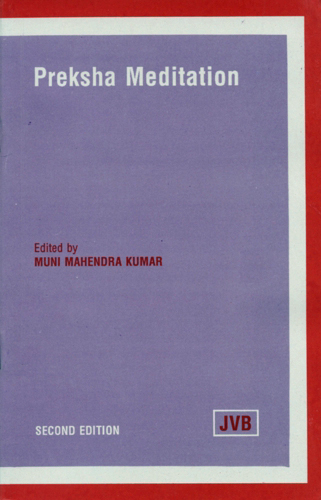Another form of psychotherapy has also been established in the system of preksha-dhyan by which practitioner can remain calm and composed even in the state of serious illness. Moreover, he can experience mental happiness without any drugs.
Practice of auto-suggestion will bring about radical attitudinal and behavioural changes. For integrated development of personality it is necessary to bring about changes in the chemistry of the body, i.e., the synthesization of various chemical factors in the body which have profound influence on the mental states and behavioural patterns must be transmuted. These chemical factors are mainly the hormones secreted and distributed by the endocrine system. Exercise of auto-suggestion influences the functioning of hypothalamus and pituitary which, in turn, produces a strong state of faith and belief. Exercise of autosuggestion (bhavana) is based on the practical application of faith and belief. The exercise brings about the necessary change in the body-chemistry, thereby weakening the forces of disease and ultimately curing it. The process of producing or transmuting the internal chemicals is a form of faith-healing or spiritual-healing.
One of the most important benefits of the practice of contemplation is the attainment of the state of bliss and blessedness.
One attains bliss (samadhi) when one is free from physical sickness (vyadhi), mental agony (adhi) and emotional malaise (upadhi). Only when one has overcome the trinity of physical, mental and emotional disorders, one can hope to attain sustained happiness.
This means that if one desires to choose the other way of life, he is to overwhelm and subjugate his carnal desires of lust and hate. And when one has discarded the path of evil trinity and adopted a way of bliss, his way of life changes radically. In fact bliss is not a miracle nor is it something reserved from a few chosen people. It is a way of life for anyone and everyone who cares to choose it. One who realises this truth - this science of life - this art of living, one can live a life of sustained happiness, i.e., bliss.
The doctrine of contemplation is an important part of Preksha meditation. Once the principle of contemplation and the technique for its practice is fully understood, a powerful tool for changing the way of life is in our hands. The aspirant of bliss, by the practice of contemplation, becomes aware of the obstacles in the process of attaining bliss. His desire for overindulgence in luxuries, his negative attitude of like and dislike, his psychological distortions etc. disappear with the subjugation of greed and discontentment. Thus, in the absence of factors which were responsible for generating the evil trinity, state of bliss is attained.
Preksha is free from theological dogmas
PREKSHA can be learnt and practised by anybody without distinction of caste, creed, colour or country. There is no communal or theological bias. It does not insist upon any particular theological belief nor does it enjoin one to change one's faith. Once Preksha becomes a regular function of one's life, he (or she) will never be over-whelmed by one's passions and emotions. He will not succumb to the stress and strain of life and consequently will not be suffering from tensions.
Uses of modern biofeedback apparatus have given scientific credibility to the practice of meditation. Practitioners have, under laboratory conditions, demonstrated that they can exercise control over some of their visceral functions. They can, while staying alert, condition their mind to produce the calm soothing rhythms of alpha waves in the brain.
Where to learn Preksha?
Though the process is not very difficult to master and practise, it is essential to learn the technique through experienced and trained teachers. A permanent centre has been established at Ladnun (Rajasthan) to give lessons and guidance to the aspirants. An associate centre is established at Delhi also. Normally a seven to ten days' retreat (training camp) is a suitable means to impart proper training. However, for the convenience of different aspirants, the period of training can be split into two or three sessions. Facilities for boarding and lodging during the retreat are provided by both the centres.
For further particulars, please write to:
| The Director | The Director |
| Tulsi Adhyatma Needam | Adhyatma Sadhna Kendra |
| Jain Vishva Bharati | Chhatarpur Road, Mehraull |
| LADNUN-341306 (India) | NEW DELHI-110030 (India) |
 Prof. Muni Mahendra Kumar
Prof. Muni Mahendra Kumar

